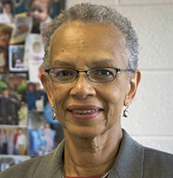Carol Malloy, a faculty member at the School of Education for 15 years, is being remembered as an accomplished teacher, influential researcher and beloved mentor.

Malloy died Jan. 17 after a brief illness in Wilmington, where she lived with her husband, William Malloy, also a retired School of Education faculty member. She was 71.
“Dr. Malloy was a treasured member of our faculty, serving as a mentor to many students and an inspiration to her colleagues,” said Bill McDiarmid, dean of the School of Education. “She was a close and dear friend to many, a genuinely extraordinary person who combined sharp intelligence and demanding standards with uncommon grace and a deeply caring heart.”
A memorial service for Malloy on Jan. 24 filled the church and fellowship hall at Chestnut Street Presbyterian Church in Wilmington, which the Malloys attended after moving to Wilmington.
Malloy’s son, Michael Malloy, said he grieves at many funerals because he feels that the deceased had not accomplished all that they were capable of. He did not feel that way about his mother, he said, because she had fulfilled her own promise through her many accomplishments.
He said had learned a central lesson from his mother: “If you do not have a plan to succeed, you have a plan to fail.”
Accomplished career
Malloy joined the School of Education to serve as associate director of the UNC-Chapel Hill Mathematics and Science Network. While serving in that role she earned a Ph.D. in curriculum and instruction from the School in 1994. She then joined the faculty, teaching secondary mathematics methods courses in the Master of Arts in Teaching program, curriculum and foundations courses for graduate students and mathematics for middle and elementary pre-service students.
Malloy was frequently recognized for her teaching and mentorship. She received Carolina’s Favorite Faculty Award in 1997. In 2009, she received the University’s Mentor Award for Lifetime Achievement. In 2010, she received the inaugural Impact Award from the Black Alumni of the School of Education.
The National Council of Teachers of Mathematics honored Malloy with its Lifetime Achievement Award for Distinguished Service to Mathematics Education in 2013.
In November Malloy received the School of Education’s Distinguished Leadership Award.
She retired from the School of Education in 2009 but continued to work in mathematics education, serving as lead author of Glencoe/McGraw-Hill K-12 School Mathematics Programs.
Influential scholar
During her scholarly career, Malloy published numerous articles and papers with colleagues. In 2000, with fellow faculty members George Noblit and husband William Malloy, Malloy co-authored “The Kids got Smarter: Case Studies of Comer Schools.”
“Their publication was among the first qualitative examinations of a comprehensive school reform effort to improve educational outcomes of underserved youth and families,” said Judith Meece, professor of educational psychology. “Throughout her career, Carol remained true to this passion in her writing and teaching.”
Malloy was born and raised in Harrisburg, Penn. She earned her bachelor’s, in mathematics and education, from West Chester University in West Chester, Penn., where she received a Distinguished Alumni Award in 2004. She earned her master’s degree, in mathematics, from Illinois Institute of Technology in Chicago.
She spent more than 20 years as a middle and high school math teacher in four urban school districts in Pennsylvania, Florida and Wisconsin before coming to Chapel Hill.
Malloy’s scholarly and professional activities focused on equity in math education and reform.
She served as president of the Benjamin Banneker Association, which supports teachers’ efforts to provide the highest quality of mathematics learning for African-American students, and received that organization’s Distinguished Member Award in 2003.
She helped write the National Council of Teachers of Mathematics’ “Principles and Standards for School Mathematics,” which is used nationwide to improve math curricula, teaching and assessment. She edited the NCTM book series “Mathematics for Every Student: Responding to Diversity.” The three-book series presented strategies for providing high-quality mathematics instruction to all students from prekindergarten through grade 12.